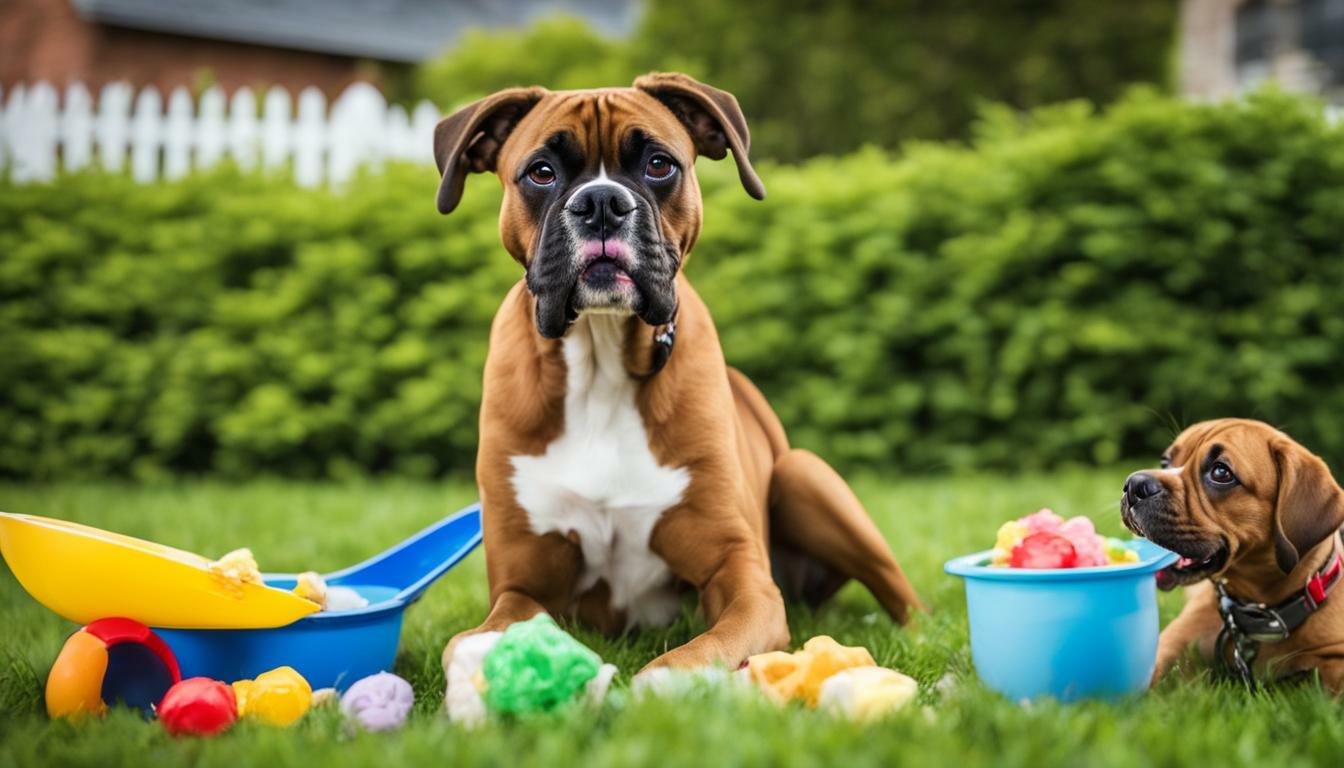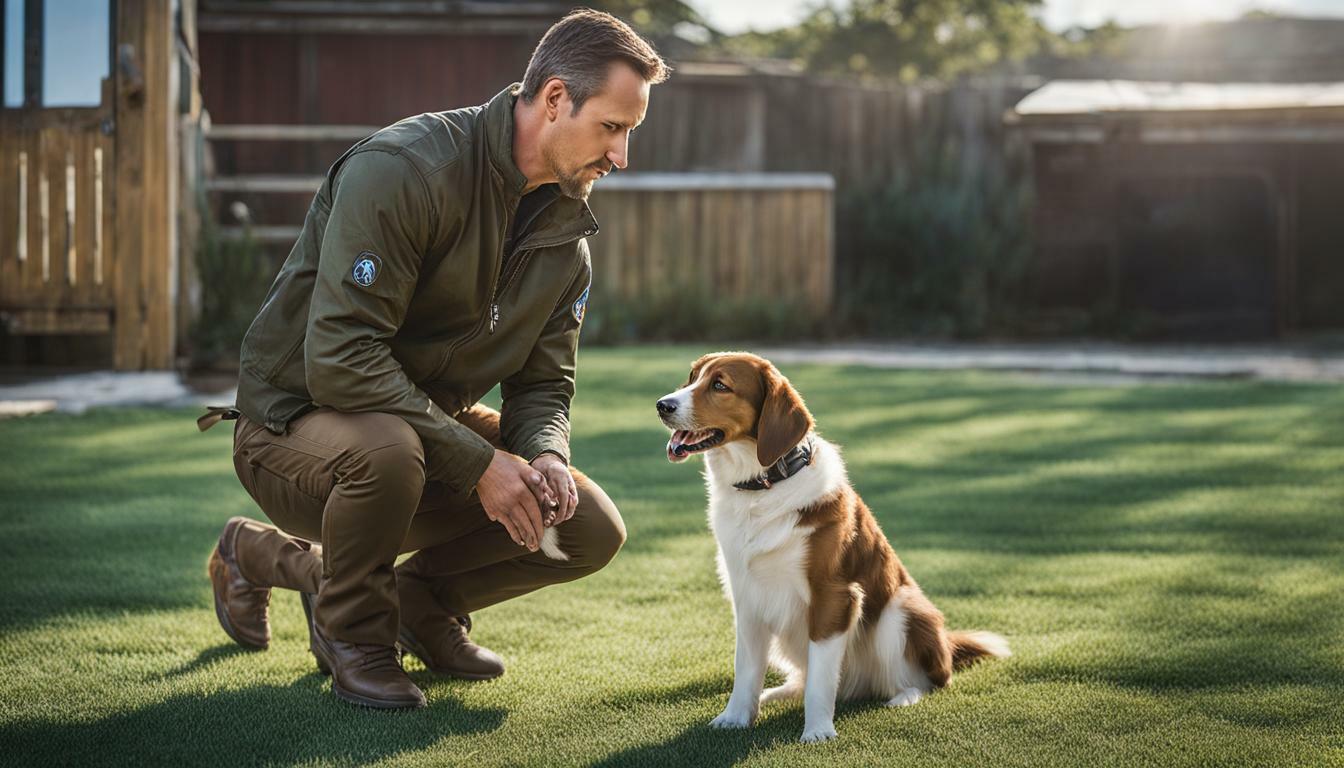Welcome to the ultimate guide for Boxer ownership! Whether you are a new or experienced dog owner, this comprehensive guide provides valuable insights and advice for raising a happy and well-adjusted Boxer. From care tips and breed information to training advice and health maintenance, we cover all aspects of owning a Boxer.
Boxers are known for their energetic and playful nature, their loyalty and protectiveness, and their friendly disposition towards both people and other animals. Understanding their unique temperament and characteristics is crucial for connecting and training your Boxer effectively.
Proper care and attention are essential for maintaining the health and wellness of your Boxer. This includes preventive healthcare measures, regular exercise, and a balanced diet that meets their nutritional requirements at every stage of life.
Whether you are looking for advice on Boxer behavior issues or tips for grooming your furry friend, this guide has got you covered!
- Understanding the Boxer breed’s unique characteristics and temperament is crucial for effective training and bonding.
- Proper care and attention are essential for maintaining the health and wellness of your Boxer.
- Boxers have specific exercise requirements to stay mentally stimulated and physically fit.
- Feeding your Boxer a balanced diet that meets their nutritional needs at every stage of life is crucial for their overall well-being.
- Maintaining a regular grooming routine is essential for the well-being and appearance of your Boxer.
Understanding the Boxer Breed: Temperament and Characteristics
Boxers are a medium-sized breed originating from Germany. They are known for their energetic and playful nature, making them excellent family pets and companions. Boxers are intelligent and highly trainable, making them a popular choice for various tasks such as police work, therapy, and service dogs.
Boxers are loyal and protective of their families, making them exceptional watchdogs. They are friendly and gentle with children and enjoy the company of other animals. Boxers love attention and are known to be clowns, always finding ways to make their owners laugh.
Boxers have a short and smooth coat that requires minimal grooming. They come in various colors, including fawn and brindle. Boxers have a distinctive face with a wrinkled forehead and an undershot jaw, giving them a unique appearance.
Boxers have a high energy level and require regular exercise to keep them healthy and happy. They enjoy walks, runs, and playing fetch. Boxers also excel in agility and obedience competitions.
Overall, Boxers are a loving and loyal breed that requires proper socialization and training to bring out their full potential. Understanding their unique temperament and characteristics is essential for creating a strong bond with your Boxer.

Bringing home a new Boxer puppy is an exciting time, but it also requires careful planning and preparation. Ensuring that your puppy has a safe and comfortable environment is essential to their well-being. Here are some Boxer dog care tips to help you set the foundation for a healthy and happy puppy:
Creating a Safe Space
Boxer puppies are curious and love to explore their surroundings. To keep them safe, create a designated area in your home where your puppy can play and sleep. This area should be free from any hazards and have comfortable bedding, toys, and water. Make sure to puppy-proof your home by hiding cords, removing poisonous plants, and keeping toxic chemicals out of reach.
Feeding Your Boxer Puppy
A well-balanced diet is essential for the growth and development of your Boxer puppy. Choose high-quality puppy food that meets their nutritional needs based on their age and weight. Overfeeding your puppy can lead to obesity and other health issues, so it’s important to follow portion control guidelines recommended by your veterinarian. Provide your puppy with fresh and clean water at all times.
Socializing Your Boxer Puppy
Socialization is crucial to help your Boxer puppy become a well-adjusted and friendly dog. Introduce your puppy to different people, animals, and environments to help them feel comfortable and confident. Socialization also involves training your puppy to interact appropriately with others and to obey basic commands. Positive reinforcement techniques, such as treats and praise, are effective in promoting good behavior and building a strong bond with your puppy.
Grooming Your Boxer Puppy
Regular grooming is essential to keep your Boxer puppy looking and feeling great. Brushing your puppy’s coat helps to remove loose fur, prevent matting, and distribute natural oils. Boxers have sensitive skin, so use a mild shampoo and avoid over-bathing. Trim your puppy’s nails regularly to prevent them from getting too long, which can cause discomfort and affect their ability to walk properly. Lastly, don’t forget to clean your puppy’s ears and brush their teeth to maintain their overall health.
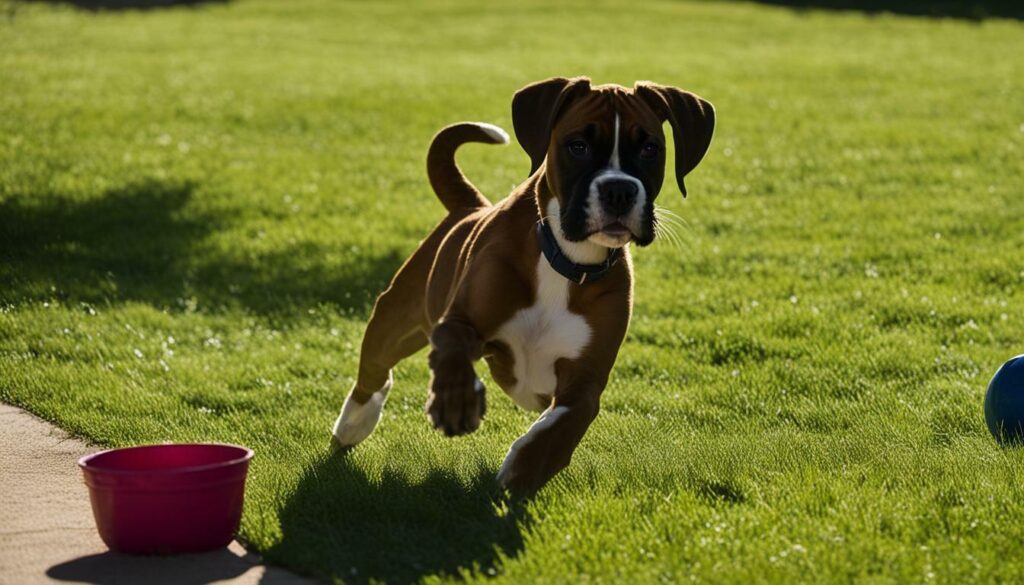
Following these Boxer dog care tips will help set the foundation for a healthy and happy puppy. By creating a safe environment, providing a well-balanced diet, socializing your puppy, and maintaining regular grooming routines, you can ensure a lifetime of joy and companionship with your beloved Boxer.
Boxer Training 101: Building a Well-Behaved Dog
Effective training is essential for a well-behaved Boxer. Without proper training, Boxers can become unruly and difficult to manage. As intelligent and highly energetic dogs, Boxers require training that is both consistent and engaging. Here are some training tips to help you establish a well-behaved Boxer:
Start with Basic Commands
Begin your Boxer’s training with basic commands such as sit, come, stay, and down. Use positive reinforcement techniques such as treats and praise to incentivize good behavior. Consistency is key in training, so make sure to practice commands regularly.
Address Common Behavior Issues
Boxers are prone to a few common behavior issues, such as jumping, chewing, and excessive barking. Address these issues early on in their training to prevent them from becoming habitual. Use redirection techniques to deter unwanted behavior, and provide plenty of toys and interactive puzzles to keep them mentally stimulated and occupied.
Use Positive Reinforcement
Boxers respond well to positive reinforcement techniques such as treats, praise, and playtime. Avoid using negative reinforcement such as physical punishment or shouting, as this can be counterproductive and harm your relationship with your Boxer.
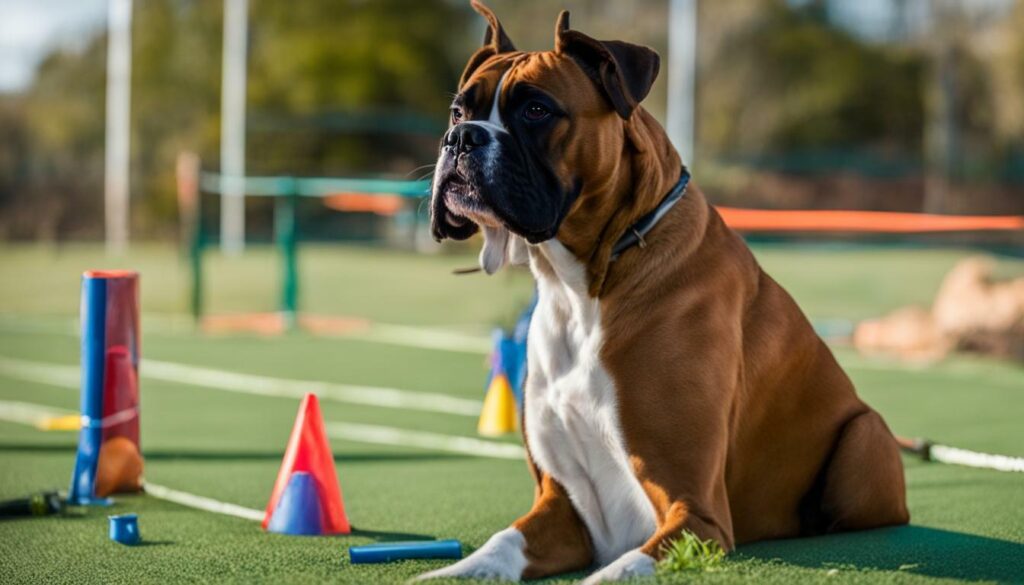
Socialization is crucial for Boxers to develop good manners and proper behavior around other dogs and people. Socialize your Boxer by exposing them to different environments and people, and reward good social behavior with treats and praise.
Stay Patient and Consistent
Training a Boxer requires patience and consistency. Don’t expect overnight results, and be prepared to put in the time and effort needed to establish good behavior habits. Stick to a consistent training routine and always use positive reinforcement techniques to build a strong bond with your furry friend.
By following these training tips, you can raise a well-behaved and happy Boxer that is a pleasure to be around.
Boxer Health and Wellness: Maintaining Optimal Condition
Boxers are generally healthy dogs, but they are prone to certain health issues that require attention. To ensure your Boxer remains healthy and happy, follow these essential health maintenance tips.
Regular Vet Check-ups
Taking your Boxer for regular vet check-ups is key to maintaining their health. During these appointments, the vet will conduct a physical examination, screen for common health issues, and provide preventive healthcare measures such as vaccination and parasite control. Your vet may also recommend specialized tests and procedures based on your Boxer’s age and medical history.

Preventive healthcare measures ensure your Boxer stays healthy and disease-free. In addition to regular check-ups, provide your Boxer with necessary vaccinations and preventative medications for fleas, ticks, heartworms, and other parasites. These measures protect your Boxer from common illnesses and save you from costly vet bills.
Healthy Diet
A healthy diet is essential for maintaining your Boxer’s health and wellness. Consult with your vet to determine the dietary requirements of your Boxer based on their age, weight, and activity level. Feed them high-quality dog food that meets their nutritional needs and avoid overfeeding, which can lead to obesity and other health issues.
Regular Exercise
Boxers have high energy levels and require regular exercise to stay healthy and happy. Provide them with daily exercise through activities such as walks, runs, or playtime in the yard. Regular exercise not only keeps your Boxer physically fit but also helps maintain their mental well-being.
Watch for Health Issues
Boxers are prone to certain health issues, such as hip dysplasia, heart issues, and cancer. Watch for any changes in your Boxer’s behavior, appetite, or activity level, and report any concerns to your vet. Early detection and treatment of health issues improve chances of successful treatment.
By following these health maintenance tips, you can help ensure your Boxer remains healthy, happy, and by your side for years to come!
Boxer Exercise Requirements: Keeping Your Dog Active
Boxers are high-energy dogs that require plenty of exercise to stay healthy and happy. In general, Boxers need at least an hour of exercise per day, with additional playtime and walks as needed. Regular exercise not only supports their physical health but can also help keep them mentally stimulated and prevent boredom and destructive behavior.
When designing your Boxer’s exercise routine, consider their age, fitness level, and individual preferences. Some Boxers may enjoy long walks, while others may prefer running, swimming, or participating in dog sports such as agility or flyball. Experiment with different activities to find what works best for your furry friend.
It’s essential to provide your Boxer with ample opportunities for playtime and social interaction with other dogs and people. Playtime can include activities such as fetch, tug-of-war, or puzzle toys that challenge their problem-solving skills.
While regular physical activity is crucial, it’s also important not to over-exercise your Boxer. Avoid strenuous exercise during hot weather or if your dog has underlying health issues. Additionally, be mindful of their joints, as Boxers are prone to hip dysplasia and other orthopedic problems.
Overall, keeping your Boxer active and engaged is key to fostering their physical and mental well-being. By providing plenty of exercise and playtime, you can ensure your furry friend stays happy and healthy for years to come.
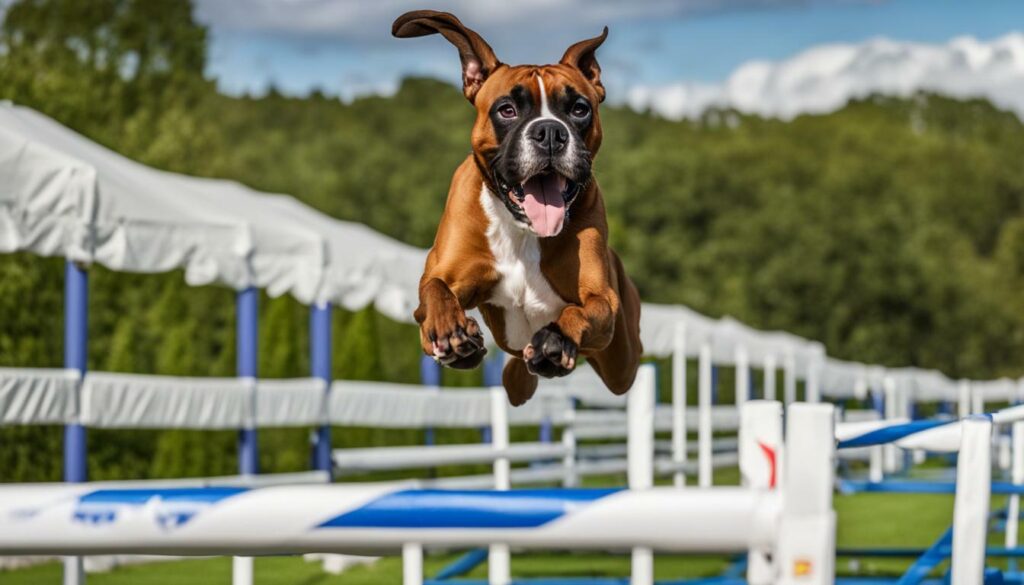
Proper nutrition is essential to maintaining the health and wellness of your Boxer. As a breed that is prone to certain health issues like heart problems, obesity, and allergies, it’s crucial to understand the dietary requirements for your furry friend.
It’s important to note that the diet recommendations provided below are general guidelines and may vary depending on factors such as your Boxer’s age, weight, activity level, and health conditions. Consult with your vet to determine the best diet for your Boxer.
Feeding Schedule: Boxers are prone to obesity, so it’s important to establish a regular feeding schedule. Adult Boxers should be fed twice a day, while puppies require frequent feeding throughout the day. Divide their daily portion into multiple small meals to prevent overeating.
Nutritional Requirements: Boxers require a balanced diet that is rich in protein, carbohydrates, and fats to maintain their energy levels. Look for dog food that contains real meat as the first ingredient and avoid those that contain fillers, artificial flavors, and preservatives. Also, ensure that the diet includes essential vitamins and minerals such as calcium, phosphorus, and omega-3 fatty acids.
Portion Control: Overfeeding your Boxer can lead to obesity and other health issues. Use measuring cups to portion out the food and avoid free-feeding your dog, which can encourage overeating.
Treats: Treats should be given in moderation and should not exceed 10% of your Boxer’s daily calorie intake. Avoid giving human food as treats, as they can be high in calories and harmful to your dog’s health.
Water: Boxers require clean and fresh water at all times. Ensure that your dog has access to clean water throughout the day and replace the water at least once a day.
Transitioning to a New Diet: Gradually transition your Boxer to a new diet over a period of 7-10 days to prevent digestive issues. Start by mixing a small amount of the new food with the old food and gradually increase the new food while decreasing the old food until the transition is complete.
Conclusion: Feeding your Boxer a well-balanced diet that meets their nutritional requirements is crucial for their overall health and well-being. Consult with your vet to determine the best diet and feeding schedule for your furry friend.

Grooming is an essential aspect of Boxer care that helps keep your furry friend looking and feeling their best. Regular grooming sessions not only remove dirt and debris from your Boxer’s coat but also allow you to check for any skin infections, lumps, or injuries that may require attention.
Here are some essential Boxer grooming tips to keep your pooch healthy and happy:
| Tip | Description |
|---|---|
| Brushing | Regular brushing is essential for maintaining a healthy coat and reducing shedding. Use a soft-bristled brush or a grooming mitt to remove loose hair and distribute natural oils throughout your Boxer’s coat. Brush your Boxer at least once a week, or more frequently during shedding season. |
| Bathing | Most Boxers don’t require frequent baths, as their coats are naturally self-cleaning. However, if your Boxer gets into something particularly messy, a bath may be necessary. Use a gentle dog shampoo and rinse thoroughly to avoid skin irritation. Avoid bathing your Boxer too frequently, as it can strip natural oils from their coat. |
| Dental Care | Regular dental care is crucial for your Boxer’s overall health. Brush their teeth at least twice a week using a dog-specific toothbrush and toothpaste. Provide them with dental chews or toys to help remove plaque and tartar buildup. |
| Nail Trimming | Trim your Boxer’s nails every 4-6 weeks to prevent them from getting too long and causing discomfort or injury. Use a sharp, dog-specific nail clipper and avoid cutting the quick (the pink part of the nail that contains blood vessels and nerves). |
| Ear Care | Regularly check your Boxer’s ears for signs of infection or inflammation, such as redness, discharge, or a foul odor. Clean their ears with a gentle ear cleaning solution and a soft cloth or cotton ball. Avoid using cotton swabs, as they can damage the ear canal. |
By following these Boxer grooming tips, you’ll help ensure that your furry friend remains healthy, happy, and looking their best.
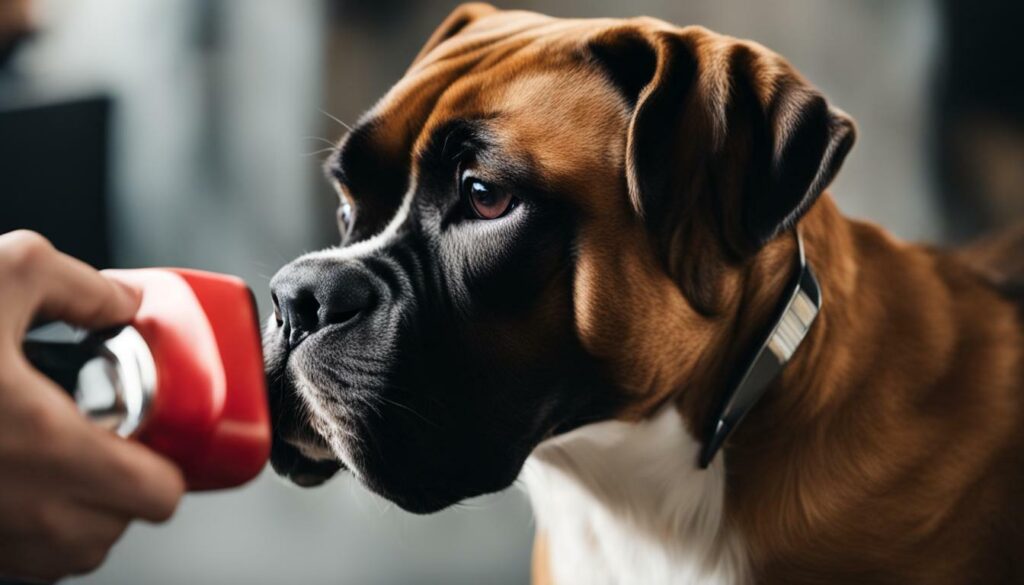
Socialization is a critical aspect of raising a well-adjusted, friendly, and obedient Boxer. Proper socialization exposes your Boxer to different environments, individuals, and other animals, helping them adjust and respond positively to varied situations.
Early socialization is especially important, as Boxer puppies go through a critical developmental phase between the ages of 3 to 14 weeks. During this stage, puppies are most receptive to new experiences and more likely to form lasting impressions about people, animals, and environments. Exposing your Boxer puppy to a wide variety of situations during this time can help them become more confident, well-adjusted adults.
When socializing your Boxer, it’s essential to introduce them to new experiences gradually and positively, using treats, positive reinforcement, and plenty of affection to help them learn and feel comfortable. Begin socializing your puppy in a controlled, safe environment, such as your home or a fenced backyard, before gradually introducing them to new and more challenging environments.
During socialization, be sure to expose your Boxer to different people, including children, people wearing hats or glasses, and those of different races and ethnicities. Similarly, introduce your Boxer to other animals, including dogs, cats, and other small pets, in a controlled environment, such as a dog park or a friend’s backyard. Supervise these interactions closely and reward your Boxer for positive behavior, such as appropriate play and calmness around other animals.
Remember that socialization is an ongoing process and should continue throughout your Boxer’s life. Regular exposure to new people, animals, and environments can help maintain your Boxer’s confidence, friendliness, and obedience.
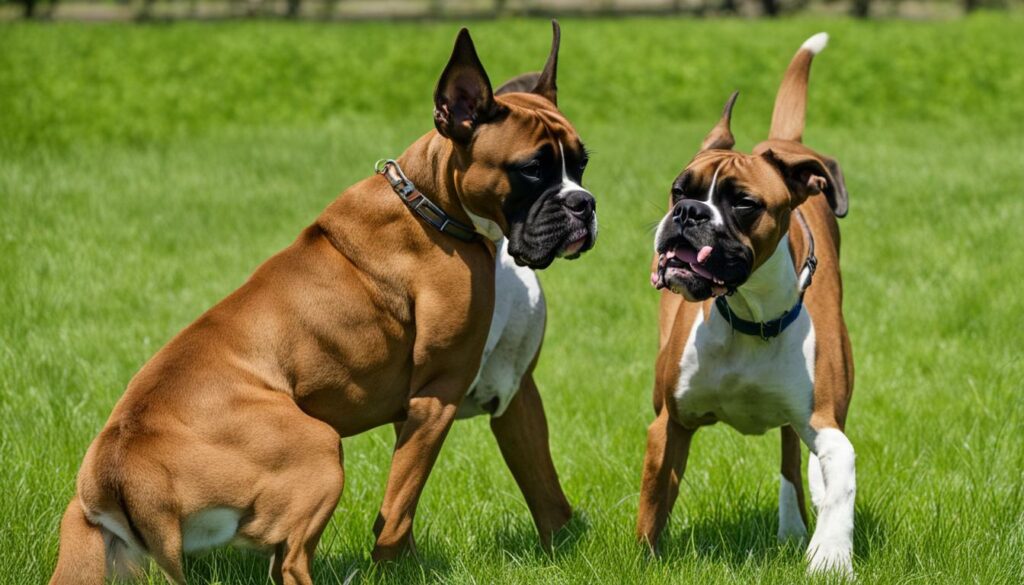
Training your Boxer to be well-behaved and obedient can also help create a well-adjusted and friendly dog. Positive reinforcement training techniques, such as using treats and praise to encourage good behavior, can help create a strong bond between you and your Boxer, fostering trust and positive interactions.
It’s also crucial to teach your Boxer basic obedience commands, such as sit, stay, come, and heel, which can help keep them safe and well-behaved in different situations. Regular training sessions, using positive reinforcement and consistency, can help reinforce these commands and maintain your Boxer’s obedience.
By socializing and training your Boxer, you can help create a happy, obedient, and friendly companion.
Boxer Behavioural Issues: Addressing Common Challenges
Boxers are a highly intelligent and energetic breed, but like all dogs, they can experience behavioral issues. Understanding the root causes and addressing them with proper training and positive reinforcement is essential for a well-behaved and happy Boxer.
Separation Anxiety
Boxers are known for their loyalty and attachment to their owners, which can sometimes lead to separation anxiety when left alone. Symptoms can include excessive barking, destructive behavior, and inappropriate elimination. To address this issue, gradually increase the time your Boxer spends alone, provide plenty of mental stimulation through toys and games, and consider crate training to provide a safe and secure environment.
Excessive Barking
While Boxers are generally friendly and social, they can be talkative, leading to excessive barking. To address this issue, identify the triggers for your Boxer’s barking, such as boredom or anxiety, and provide appropriate outlets for their energy through exercise and play. Use positive reinforcement to discourage excessive barking, rewarding your Boxer when they remain quiet.
Jumping
Boxers are known for their high energy levels and enthusiasm, which can sometimes lead to jumping up on people. To address this issue, train your Boxer to sit and stay, rewarding them when they remain calm and grounded. Encourage visitors to ignore your Boxer’s jumping and reward them only when all paws are on the ground.
Leash Pulling
Boxers are strong and athletic, which can make leash pulling a common issue. To address this issue, use a front-clip harness or head harness to provide better control and discourage pulling. Practice loose leash walking and reward your Boxer for walking calmly beside you.

Addressing these common behavioral issues requires patience, consistency, and positive reinforcement. By understanding your Boxer’s unique temperament and training needs, you can create a well-behaved and happy companion that brings joy to your life for years to come.
Boxer Aging: Caring for Your Senior Companion
As your beloved Boxer ages, their care requirements change. It’s important to understand the unique health considerations and adjustments needed to ensure a comfortable and fulfilling life for your senior companion.
Boxer Health Maintenance: Regular veterinary check-ups are crucial for senior Boxers to detect any age-related health issues, such as arthritis, dental problems, and cognitive decline. Monitor their weight, mobility, and energy levels, as well as any changes in behavior, appetite, or bathroom habits.
Boxer Diet Recommendations: Senior Boxers have lower energy requirements and may need a specialized diet to maintain optimal health and nutrition. Consult with your veterinarian for dietary adjustments and portion control. Adequate hydration is also essential, so ensure plenty of fresh water is available.

Exercise modifications may be necessary for senior Boxers, but it’s important to keep them active to maintain muscle tone and mental stimulation. Consider low-impact activities such as short walks, gentle play, and puzzle toys. Provide a soft and comfortable sleeping area, and ensure their surroundings are free from hazards and obstacles.
Adjusting to the aging process can be challenging, but with proper care and attention, you can provide your senior Boxer with a happy and comfortable quality of life.
Boxer Ownership Tips: Creating a Lifetime of Joy and Happiness
Now that you have learned all the essential aspects of owning a Boxer, it’s time to bring everything together and create a lifetime of joy and happiness with your furry friend. Here are some final tips to keep in mind:
Keep Up with Routine Care
Boxers require routine care to stay healthy and happy. This includes regular vet check-ups, preventive healthcare measures, grooming, exercise, and a balanced diet. Stick to a routine that works for both you and your Boxer and always prioritize their well-being.
Establish a Strong Bond Through Positive Reinforcement
Positive reinforcement is a powerful tool for building a strong bond with your Boxer. Reward good behavior, use treats to encourage positive interactions, and avoid punishment-based training techniques. This approach will help your Boxer associate you with positive experiences and build trust.
Stay Consistent with Training
Consistency is key in training your Boxer. Set clear boundaries and be consistent with your commands, rewards, and consequences. This will help your Boxer learn what is expected of them and avoid confusion or anxiety.
Provide Mental Stimulation with Varied Activities
Boxers are intelligent and energetic dogs that require mental stimulation, as well as physical exercise. Provide varied activities such as agility training, puzzle games, and interactive toys to keep your Boxer engaged and mentally stimulated.
Stay Attentive to Your Boxer’s Health
Boxers are prone to certain health issues, such as hip dysplasia, cancer, and heart conditions. Stay attentive to your Boxer’s health and report any changes in behavior or physical condition to your vet as soon as possible. Early detection and intervention can make all the difference in your Boxer’s health and longevity.
Create a Safe and Comfortable Environment
Boxers thrive in a safe and comfortable environment. Provide a cozy and clean sleeping area, secure outdoor space, and avoid exposing your Boxer to extreme temperatures or hazardous materials. Creating a safe and comfortable environment will help your Boxer feel secure and happy in their home.
Show Love and Affection Every Day
Above all, show your Boxer love and affection every day. Spend quality time with them, cuddle, and play. This will help your Boxer feel cherished and valued, strengthening your bond and creating a lifetime of joy and happiness for both of you.
FAQ
Q: What is the Boxer breed known for?
A: The Boxer breed is known for its energetic and playful nature, loyalty and protectiveness, and friendly disposition towards both people and other animals.
Q: How should I care for a Boxer puppy?
A: To care for a Boxer puppy, create a safe and comfortable environment, focus on socialization, provide proper feeding and grooming, and ensure regular veterinary check-ups.
Q: How can I train my Boxer?
A: Effective training for a Boxer involves establishing basic commands, addressing behavior issues through positive reinforcement, and fostering a strong bond between you and your dog.
Q: What are some health considerations for Boxers?
A: It is important to maintain the health and wellness of your Boxer through preventive healthcare measures, regular vet check-ups, vaccination schedules, parasite control, and awareness of common health issues.
Q: How much exercise does a Boxer need?
A: Boxers have high energy levels and require regular exercise to stay happy and healthy. Engage them in different activities and routines that provide mental stimulation and keep them physically fit.
Q: What should I feed my Boxer?
A: Proper nutrition is essential for your Boxer’s overall health. Follow dietary recommendations, practice portion control, and choose the best food options to meet your Boxer’s nutritional needs at every life stage.
Q: How should I groom my Boxer?
A: Maintaining a regular grooming routine is important for your Boxer’s well-being and appearance. Use proper brushing techniques, take care of dental hygiene, trim nails, and follow bathing guidelines.
Q: How can I socialize my Boxer?
A: Proper socialization is crucial for Boxers to develop good manners, confidence, and friendliness. Expose them to various environments, ensure positive interactions with different individuals, and provide positive experiences.
Q: How can I address behavioral issues in my Boxer?
A: Understanding the unique temperament of Boxers is key in addressing behavioral issues. Learn how to handle challenges such as separation anxiety, excessive barking, jumping, and leash pulling to create harmony with your Boxer.
Q: How should I care for my senior Boxer?
A: As your Boxer ages, their care requirements change. Consider specific health considerations, modify exercise routines, adjust diet, and provide overall care to ensure a comfortable and fulfilling life for your senior Boxer.
Q: What are some tips for Boxer ownership?
A: To create a lifetime of joy and happiness with your Boxer, focus on maintaining a healthy lifestyle, nurturing a strong bond, and applying the tips and advice provided throughout this guide.
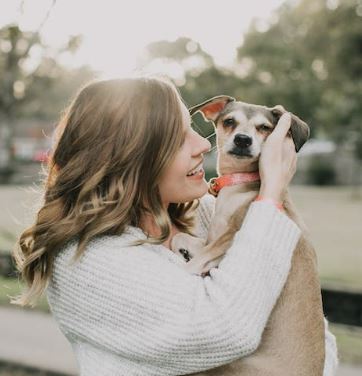
Marissa Delotta, 36, from Dayton, Ohio, is the creative force behind Roverboard.com, a beloved online destination for dog lovers. As a dedicated mom and canine enthusiast, Marissa combines her family experiences with her love for dogs to offer a platform where dog owners can exchange tips, heartwarming stories, and advice. Her website has become a vibrant community for sharing the joys of dog parenting. In her free time, Marissa enjoys exploring dog parks with her family and volunteering at local animal shelters.

